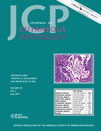Tumor burden of sentinel lymph node metastasis in Merkel cell carcinoma
Abstract
Background: The applicability of sentinel lymph node biopsy (SLNB) for staging has been recognized in association with Merkel cell carcinoma (MCC). However, the concept of tumor burden with respect to MCC involving sentinel lymph nodes has not been analyzed. Our aim was to assess tumor burden in the sentinel lymph nodes of MCC patients.
Methods and Results: This retrospective study analyzes 15 consecutive patients and 57 sentinel lymph nodes. Immunohistochemical re-evaluation of the sentinel lymph nodes was performed. Positive sentinel node metastases were classified according to type of invasion, size and tumor burden. Occult metastases were observed in 36% of the patients. Maximal sizes of the metastatic foci and tumor burden in the lymph nodes were larger than what has been reported in melanoma and breast cancer sentinel lymph nodes. The distribution of metastatic cells in the involved lymph nodes was mostly combination type with only one marginal sinus type. False-negative lymph nodes were found in 30% of the patients. Immunohistochemical re-evaluation decreased this figure to 22%.
Conclusions: Metastatic foci and tumor burden in positive sentinel lymph nodes seem to be larger in MCC than in melanoma and breast cancer sentinel nodes. Statistical analysis showed no correlation between tumor burden and survival. In the context of MCC, false-negative sentinel lymph nodes can and should be limited by using immunohistochemistry.
Koljonen V, Böhling T, Virolainen S. Tumor burden of sentinel lymph node metastasis in Merkel cell carcinoma.




